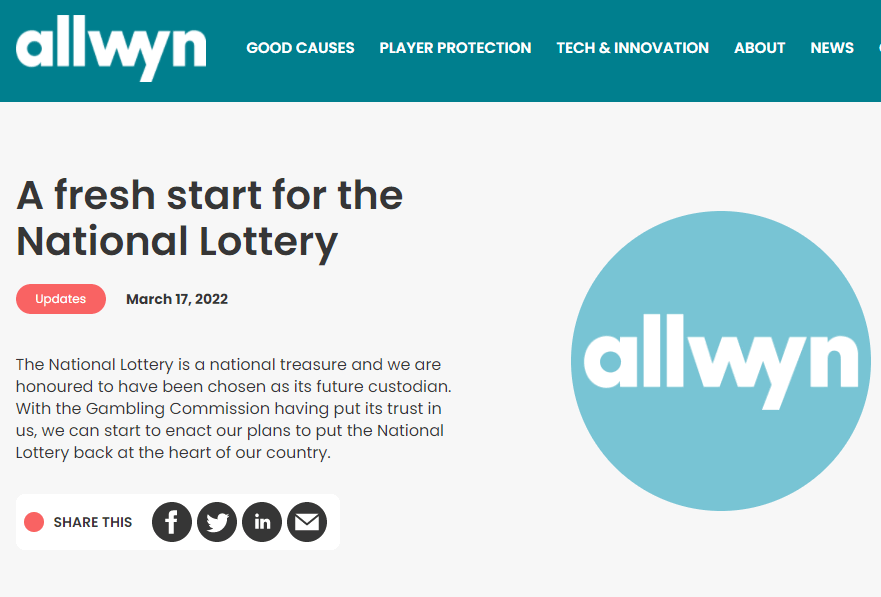One of the recent news stories circulating regarding the UK gambling scene has been over the licence of the National Lottery. Due to expire in 2024, the Gambling Commission ran a competition so as to decide upon the next licensee. That competition heated up, with several big-name applicants submitting their bids to take control of the country’s biggest lottery. Camelot, which has been in possession of the licence ever since The National Lottery began operating in 1994, also applied to continue hosting it.
Yet things don’t seem to have gone in the direction that Camelot wanted, or potentially expected. Instead, the Gambling Commission has chosen Allwyn Entertainment Limited, a Czech-owned operator, to take over control of the lottery. This came about amid growing concerns over the returns being made for good causes under the control of Camelot. Once 2024 rolls around, it will mark the first time that another operator has been responsible for running the country’s National Lottery.
Why Did Camelot Lose Out on the Lottery Licence?

Since the lottery launched in the UK, players have raised over £45 billion, and this money has been donated to 660,000 different good causes across the country. It has been utilised to transform peoples’ lives by contributing to the arts, sports, communities, and the country’s heritage sites.
When the Commission launched the competition for the 2024 licence, a large number of applicants came forward with their bids to take over. In fact, more applications than ever before were submitted to the regulatory body. And as noted, Camelot looked to regain the licence for another tenure as operator. Potentially it believed that it could easily take control, having outlasted five Prime Ministers and fought off strong competition in the past, even outdoing Richard Branson.
Allwyn Entertainment didn’t have it easy, either. As well as fending off Camelot, it had to go up against companies like Sisal (which looked like quite a strong competitor until it was bought for £1.62 billion by Flutter midway through the competition) and media tycoon Richard Desmond.
What is it about Allwyn that made the Commission decide it was a better fit than the long-running operator in Canada’s Camelot? And what does the change mean for the 1,000 people working for Camelot in Watford?
Well, the Czech company, which is owned by billionaire Karel Komárek, runs lotteries within the Czech Republic, Cyprus, Austria, Italy and Greece already. And so as to draw more attention to itself and what it could provide, the company hired a selection of business stars. Sir Keith Mills, who invented the Air Miles and Nectar Points loyalty programs, as well as be a driving force behind the country’s 2012 bid to host the Olympics, took leadership of this drive for Allwyn. He put up a united front with Justin King, who is the former Sainsbury’s boss, and now works as chairman for the UK branch of Allwyn Entertainment.
Yet there has been little insight from the Commission as to why this supreme duo of businessmen was able to outdo Camelot. The competition’s whole process is very much a secret one. As it happens, code names are utilised for each company when they are marked on different categories like technology and their planned returns for good causes from the lottery.
But Camelot has been repeatedly under pressure in recent times due to the profits from The National Lottery rising at a much swifter pace than the returns to good causes. And it was due to this that it went through a rebuke from the National Audit Office back in 2017.
Camelot Stands Firm on Its Profit and Returns to Good Causes
 Even though the rebuke seemed to cast a negative light on Camelot, the company remained steadfast in its figures. It stressed that its profits of around £95 million over the past two years amounts to about 1% of the total ticket sales from the lottery. At the same time, the company noted a recent uptick in money donated to good causes, although this fell below £1.5 billion in the year of the rebuke. For the past two years, that has sat above the £1.7 billion mark. That came about thanks to record ticket sales of around £8 billion.
Even though the rebuke seemed to cast a negative light on Camelot, the company remained steadfast in its figures. It stressed that its profits of around £95 million over the past two years amounts to about 1% of the total ticket sales from the lottery. At the same time, the company noted a recent uptick in money donated to good causes, although this fell below £1.5 billion in the year of the rebuke. For the past two years, that has sat above the £1.7 billion mark. That came about thanks to record ticket sales of around £8 billion.
Despite this, Allwyn Entertainment has seemingly promised to do much better than the previous Camelot figures. The company has stated that it intends to return more than £30 billion to good causes across the UK in its first 10 years. This, it says, it will do by recapturing the glamour of the weekly draw that brought so many people in back in the day. Additionally, Allwyn intends to introduce extra super national lotteries, similar to the EuroMillions that currently takes place. Larger jackpots will bring in more players, the company says.
At the same time, the operator intends to flood the lottery with a host of new technology, which will hopefully draw in the country’s younger players who have turned to online casino and sports betting options instead. Because of this, a £9 million decline in regular players has been experienced since 1994.
Allwyn aims to offer heightened technology via a partnership with the Vodafone brand, and this will be operational within shops as well. This means that players across the United Kingdom can utilise their phone to access products like scratch cards, and this will allow the high street to share in the income instead of losing out on a lot to the online world.
Social Responsibility a Key Element
 Responsible gambling was also high on the cards for the Gambling Commission of the country, with gambling addiction being a concern for the Government. Camelot received a lot of criticism in recent times for trying to copy casinos by introducing high-octane online instant win games.
Responsible gambling was also high on the cards for the Gambling Commission of the country, with gambling addiction being a concern for the Government. Camelot received a lot of criticism in recent times for trying to copy casinos by introducing high-octane online instant win games.
On the other hand, Allwyn took the decision to put responsible gambling at the forefront of its bid, with a strong plan in place to introduce strict controls that prevent people from spending more money than they can afford. This will potentially include restrictions on being able to play repeatedly late at night.
Should the Camelot handover proceed, it would likely cause a bit of an existential issue for the operator. Owned by the Ontario Teachers’ Pension Plan, which is a vast investment fund in itself, it possesses almost £140 billion in management assets. While Camelot has been quite the nice investment as part of this, the sole reason for it is to run the National Lottery in the UK. Therefore, the future of the operator remains unclear, with chairman, Sir Nigel Railton, stating that he was “incredibly disappointed” by the outcome of the competition. Camelot may still legally challenge the decision.
One final thing of note regarding Allwyn Entertainment, is that the Labour Party stated that the government needs to be satisfied that Komarek is not linked with Russia. That is not likely to be the case considering the billionaire has a gas storage venture with Gazprom within his native homeland of Czechia and has condemned Putin’s invasion of Ukraine, and he is currently working with the Prague government to see the asset nationalised.
Yet there is hope for the 1,000 people employed in Watford by Camelot. Even if the current operator does not decide to challenge the decision of the Commission, or it is unable to do so, the likelihood is that the employees will simply be transferred across to the new incumbent, safeguarding their jobs.

